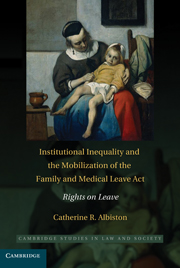Book contents
- Frontmatter
- Contents
- Preface
- Acknowledgments
- 1 Institutions, Inequality, and the Mobilization of Rights
- 2 The Social Institution of Work
- 3 Institutional Inequality and Legal Reform
- 4 Mobilizing the FMLA in the Workplace: Rights, Institutions, and Social Meaning
- 5 Mobilizing Rights in the Courts: The Paradox of Losing by Winning
- Conclusion
- Appendix A
- Appendix B
- References
- Index
- Cambridge Cultural Social Studies
Conclusion
Published online by Cambridge University Press: 05 October 2010
- Frontmatter
- Contents
- Preface
- Acknowledgments
- 1 Institutions, Inequality, and the Mobilization of Rights
- 2 The Social Institution of Work
- 3 Institutional Inequality and Legal Reform
- 4 Mobilizing the FMLA in the Workplace: Rights, Institutions, and Social Meaning
- 5 Mobilizing Rights in the Courts: The Paradox of Losing by Winning
- Conclusion
- Appendix A
- Appendix B
- References
- Index
- Cambridge Cultural Social Studies
Summary
THE STORY OF THE FMLA IS A FAMILIAR ONE IN MANY WAYS. New rights promise to change society in fundamental ways that will help eradicate inequality. In reality, however, individuals fail to mobilize these rights, or when they do, their claims are seldom successful. Organizational priorities, power differentials, the influence of family and friends, the inherent conservatism of courts, and the clash between rights and other normative systems all create obstacles to social change. As a result, these new rights fail to live up to their potential. This facile summary, however, does not capture the structural and institutional mechanisms in play in the mobilization process, mechanisms that this study seeks to illuminate. Examining these mechanisms is a way to begin to make theoretical sense of the myriad obstacles to rights mobilization identified in previous research, and to begin to consider systematically the conditions under which these obstacles might be overcome.
The FMLA responds to complex problems that arise from significant institutional change. Longstanding historical relationships among work, gender, and disability have begun to shift with changes in the labor market, in family structure, in women's workforce participation, and in the social understanding of what disability is and what it means. Yet the FMLA is often portrayed as a straightforward regulation of workplace practices, and resistance to this new law could easily be dismissed as merely the continuing influence of persistent stereotypes about the abilities of women, mothers, and people with disabilities.
- Type
- Chapter
- Information
- Institutional Inequality and the Mobilization of the Family and Medical Leave ActRights on Leave, pp. 235 - 250Publisher: Cambridge University PressPrint publication year: 2010

